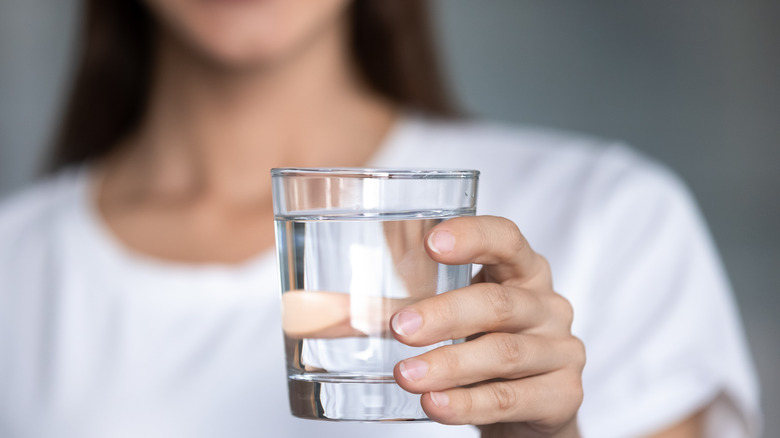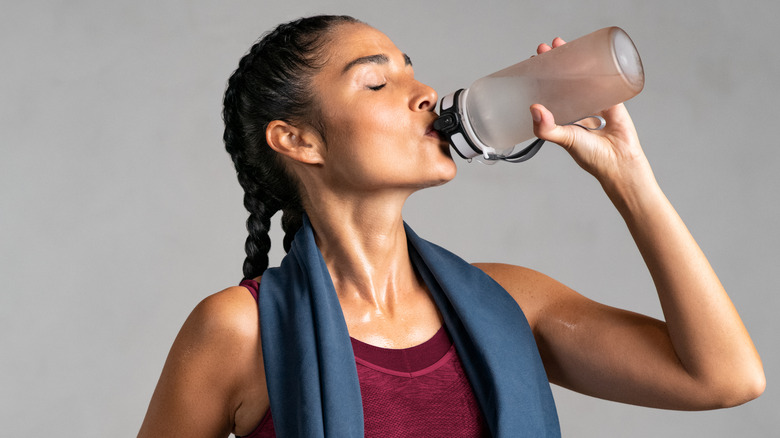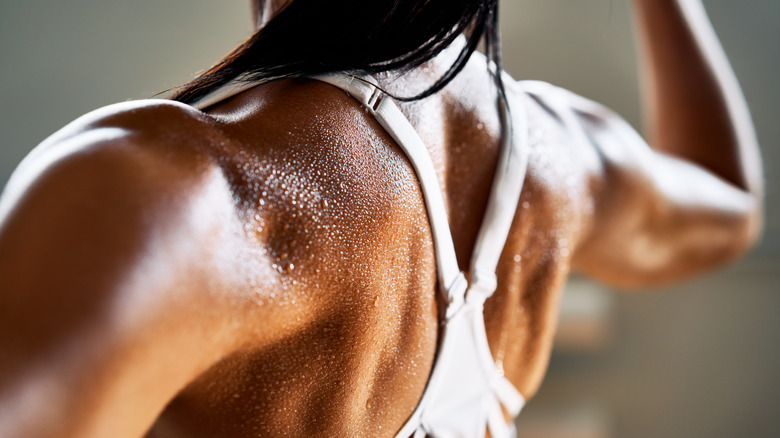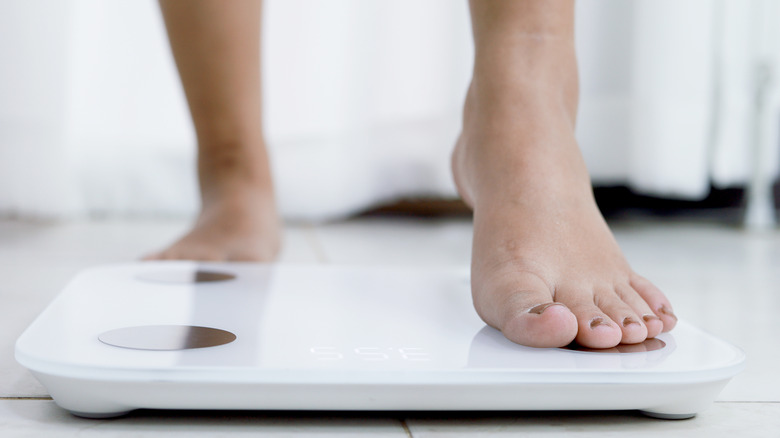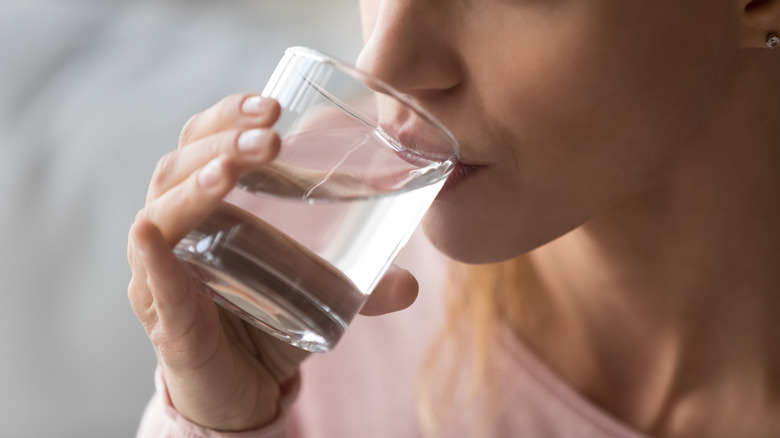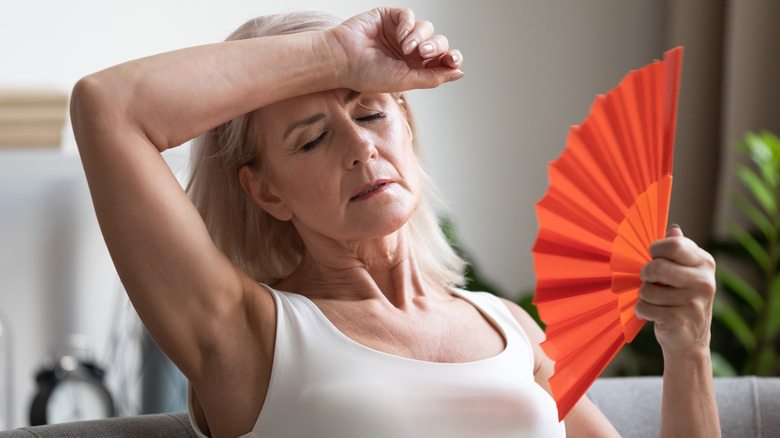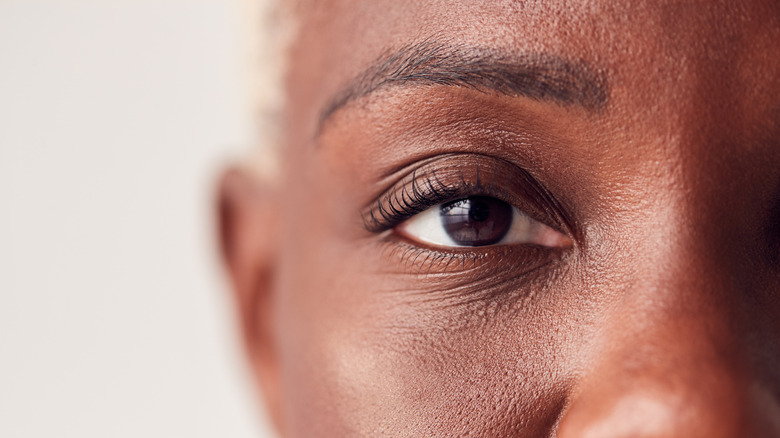What Happens To Your Body When You Drink Water Every Day
Did you know that once you start feeling thirsty, you may already be dehydrated? This event is one we take for granted, but it's actually pretty amazing when you think about it. Harvard University explains that your body goes through lots of changes as soon as it starts feeling low on water, including changing your blood pressure and heart rate. You might not notice those changes much, but you'll definitely feel it when thirst hits — and it's probably something to pay attention to.
Dehydration is bad news, period. It can cause fatigue, headaches, temperature sensitivity, high heart rate, and dizziness, to name a few symptoms (via Cleveland Clinic). Quite simply, our bodies need water, and they need it continuously. According to the National Academies of Sciences, Engineering, and Medicine, the daily amount to strive for is close to 11.5 cups of water for women and nearly 12.7 cups for men.
Try your best to drink enough water each day, and you just might find yourself reaping the following benefits.
Your hunger may decrease
If you're someone who has to have a drink with each meal, you might notice that the mere act of drinking can help fill up your hungry stomach. Although it seems like it wouldn't be too helpful in this area, water could make you feel fuller quicker, leading to a lower risk of overeating and staving off that appetite a little longer.
A 2010 clinical report presented at a meeting of the American Chemical Society noted the results of a study that explored the relationship between water consumption and weight loss. Senior author of the study, Brenda Davy explained the results: "Over the course of 12 weeks, dieters who drank water before meals, three times per day, lost about 5 pounds more than dieters who did not increase their water intake." Davy reasoned that drinking a zero-calorie beverage like water helps fill the stomach, causing people to eat less during a meal.
Additionally, Penn State Guthrie Chair of Nutrition, Dr. Barbara Rolls, said that water-based foods could even lower hunger. A study she and her colleagues conducted found that serving women soup before lunch was more effective at lowering lunch calorie consumption than serving them a glass of water along with a casserole made with the same exact ingredients and portions as the soup.
You might have more energy
Dehydration can affect the way you sleep, so it makes sense that drinking enough water every day could help you get the hours of shuteye you need each night to feel refreshed in the morning. So how does it do it? The National Sleep Foundation explains that when you're dehydrated, which can happen easily at night, your body's circadian rhythm may take over to let you know you need to rehydrate. That could be one of the reasons you find yourself waking in the middle of the night.
Therefore, drinking plenty of water throughout the day could make your body less likely to wake you up at night. You'll get more sleep, potentially giving you more energy the next day. It's a win-win.
Another way water energizes you is by perking up those muscles. Biochemist Dr. Bary Sears told NBC News that water could help the body maintain a more consistent energy level by keeping the muscles energized. Sears added, "If you don't have adequate hydration in the cells, your ability to produce energy (such as ATP) is reduced and you feel fatigued."
You may recover from workouts more easily
Thirst creeps up quickly when you're working out, which is one reason why it's crucial to remember that water bottle when you hit the gym. But water plays an equally important role in keeping you on track with fitness: It helps your body recover from a workout.
Robert Wildman, fellow of the International Society of Sports Nutrition, explained in an article for Bodybuilding.com that water is just as important for your workout recovery as protein and other nutrients. According to Wildman, skeletal muscle is made up of mostly water. When muscles contract and expand, they need water to do it. But when you're dehydrated, the blood will take water from the muscles to ensure proper circulation, basically making the muscles less effective at synthesizing the proteins they need to recover and get stronger.
Registered dietitian Renee Melton told WebMD that you should stay adequately hydrated for workouts by drinking water before and during exercise. According to Melton, shoot for 15 to 20 ounces of water one to two hours before working out, 8 to 10 ounces 15 minutes before you start, and another 8 ounces every 15 minutes during a workout.
You'll sweat away yucky stuff
Water makes up a significant portion of the sweat that comes out of your body when you're hot or working out. Although we don't love how sweating feels, it's a necessary part of how the body functions. Sweat keeps us cool and plays a role in the smells we produce as humans — not necessarily an attractive thought, but those smells are symbolic of male and female attraction (per Popular Mechanics).
Science also suggests that sweat may help you get rid of bacteria on your body rather than absorbing it through the skin or ingesting it. A 2015 scientific review published in Glycobiology explored how sweat helps protect the body from infection. According to the review, tears, saliva, and milk contain glycoproteins that allow bacteria and other pathogens to bind to them, essentially whisking them away from the body when excreted. Research studied in the review found evidence to suggest that sweat can act similarly, as it also contains glycoproteins.
You might notice a change on the scale
If you bring up to your doctor that you're having trouble losing weight, you might be met with the question, "How much water do you drink each day?" That's because study after study shows that getting enough water in your diet can contribute to weight loss.
One reason is that water is naturally free of calories, so replacing sugary, high-calorie drinks with water can decrease your daily calories. Plus, drinking water can suppress your appetite. board-certified physician nutrition specialist Melina Jampolis told Johns Hopkins University: "You may be able to decrease appetite by drinking water if you are, in fact, low in water, not calories."
Water may also increase metabolism, which can lead to more effective weight loss. In a 2003 study in the Journal of Clinical Endocrinology and Metabolism, participants increased their metabolic rate by 30% by upping their water intake by 500 milliliters each day. Additionally, a 2014 study in the Journal of Natural Science, Biology, and Medicine found that increasing water intake by 1.5 liters a day effectively reduced body fat, weight, and appetite.
You'll probably breathe better
Water sends aid to just about every part of the body, including your airways. According to Medical News Today, airways restrict themselves when you're dehydrated in an attempt to save water. Of course, when your airways are restricted, they make it more difficult to breathe, especially for people with respiratory conditions.
And if you do have a respiratory condition, like asthma or chronic obstructive pulmonary disease (COPD), water could help you even more than the average person. Lung Health Institute explains that water thins out mucus, allowing your coughs to be more productive at bringing it up. Cardiovascular and pulmonary physical therapy specialist Jennifer M. Ryan told Rush University Medical Center that staying hydrated is key for people with lung problems. "Staying well hydrated by taking in fluids throughout the day helps keep the mucosal linings in the lungs thin. This thinner lining helps the lungs function better," she explained.
You protect your heart
What's one organ that absolutely does not appreciate dehydration? The heart. Being dehydrated can actually put a strain on the heart, making you more at risk for cardiovascular disease down the road.
Water is necessary for your blood and heart to work well together. Remember that most of your body is water, and for a good reason: Your blood is also mostly water, and your blood goes all through your body. Of course, the heart is at the center of it all, pumping the blood that your body needs for ample oxygen and nutrients.
The Heart Foundation reveals that a lot of negative things affecting your heart happen when you become dehydrated. It starts with a decrease in blood volume, which causes your heart to pump blood faster to get it through the body. When your heart does this, it consequently raises your heart rate and blood pressure. Over time, this consistent cycle can make your heart work harder to do its usual duties.
Your blood sugar evens out
The body works in miraculous ways, and water plays a role in many of those remarkable tasks it carries out. When something is wrong, your body will attempt to fix the problem in the best way it knows how. Such is the case in people with diabetes, who have to monitor their blood sugar levels. When blood sugar spikes, the body removes excess blood sugar from it by moving it out in the urine. To do this, it needs some extra water to help carry blood sugar out through the blood (via Diabetes.co.uk).
Therefore, drinking enough water could make this process easier on your body, allowing it to take out the blood sugar you don't need more effectively. Registered dietitian and diabetes specialist Lisa McDermott explained to Everyday Health that diabetes could even lead to dehydration. That's because it causes more frequent urination, leading to a seemingly neverending cycle of your body needing water to do its job. The best way to prevent this from happening is, of course, to drink plenty of water each day.
You'll get more out of your food
Water does a body good! It essentially works as a carrier for things that need to get to other places in your body, kind of like a ride-or-die partner for the blood. And one extremely important way it makes sure the body functions properly is by carrying necessary nutrients where they need to go after getting each nutrient gets broken down from food. It's all part of the digestive process, in which water has a starring role.
According to an assistant professor of medicine at Mayo Clinic's College of Medicine, Michael Picco, water sits at the helm of the digestive process that turns food into the nutrients we need. "Water and other liquids help break down food so that your body can absorb the nutrients. Water also softens stool, which helps prevent constipation," Picco told USA Today. So, if you're feeling like your digestive system could use a boost, try eating your next meal with a glass of water.
You might get a mood boost
If you fell short on your ideal water intake one day, try making up for it the next. How do you feel? There's a chance that you might feel better both physically and emotionally. That's because some research points to water being a natural mood-booster. When you don't get enough of it, your lack of water could be a downer.
A study conducted by researchers at the University of Connecticut examined the effects of dehydration on men and women. Once dehydrated, the women experienced trouble concentrating and felt that tasks seemed more difficult. The men experienced more tension and anxiety when dehydrated. Study co-author Harris Lieberman explained, "Even mild dehydration that can occur during the course of our ordinary daily activities can degrade how we are feeling – especially for women, who appear to be more susceptible to the adverse effects of low levels of dehydration than men."
Another study, this one published in a 2014 edition of PLOS One, found that decreasing water intake negatively affected the participants' mood, calmness level, energy, and positive emotions. In contrast, upping water intake decreased fatigue and confusion.
You could feel more comfortable
When you drink enough water, you allow your body to be able to sweat like it needs to. Although sweating isn't necessarily a comfortable thing at first, its very point is to cool you down when you're hot. Once you get past the stickiness and ick factor, you'll realize that a light breeze feels way better when you have some sweat on your skin.
Water in the form of sweat also helps release heat from the body, leading to a cooler feel. According to Nature, "Water has a large capacity for vaporization of heat, which allows a loss of heat from the body even when ambient temperature is higher than body temperature. When sweating is elicited, evaporation of water from the skin surface is a very efficient way to lose heat."
This is why it's imperative to rehydrate yourself in hot weather. Water helps your blood flow to the skin, which brings extra heat away from your body. And after that, your body produces sweat. The more you sweat, the more water you need to replenish in your body so that it can keep doing what it needs to keep you cool and comfy (via Verywell Fit).
Your eyes might feel better
When you feel really thirsty, you might also notice some changes to your eyes. And if you haven't yet, pay attention the next time you're parched. For some people, itchy and dry eyes are a symptom of dehydration. You might also feel burning, light sensitivity, or the feeling that something is in your eye.
According to Healthline, your eyes have natural lubrication that prevents them from feeling these symptoms. However, an important part of that lubrication is water that makes up the aqueous layer. Dehydration may cause this layer not to have enough water, which could, in turn, affect how your eyes feel.
Using eye drops every day to relieve symptoms may do more harm than good, though, so it's best to get to the root of the cause to clear them up. And that, of course, means drinking the right amount of water each day to prevent dehydration from happening in the first place.
You could avoid a hangover
There are a couple of reasons that bars and restaurants usually offer patrons a glass of water when they order an alcoholic drink. First, water can prevent people from drinking glass after glass of alcohol, leading to a quick boozy feeling. Second, water may actually help avoid hangovers — or, at least, control the symptoms a little better.
The National Health Service explains that dehydration is a major cause of hangover symptoms. Alcohol also boosts the need to urinate, leading to dehydration and putting drinkers more at risk of not having enough water in their bodies. Ensuring that you drink enough water before and during a night of drinking could give you the hydration you need to avoid things like headaches and irritability in the morning.
According to NPR, a good rule of thumb for drinkers is to drink water alongside your alcohol. "Alternating between alcoholic beverages and H2O can help prevent the dehydration that accompanies a night of drinking," the article explained.
